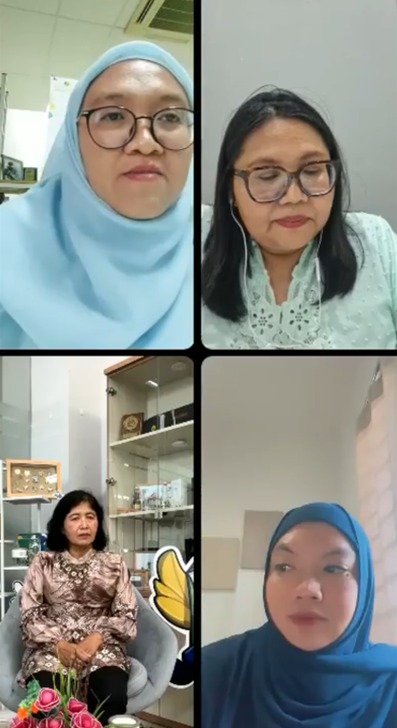On Friday, April 25th, UI GreenMetric celebrated the spirit of Kartini—Indonesia’s pioneering advocate for women’s rights—by holding a special Instagram Live Discussion titled “Jejak Kartini Masa Kini: Kepemimpinan Perempuan di Dunia yang Berkelanjutan.” This event honored Kartini’s enduring legacy by amplifying the voices of modern-day Indonesian women who are shaping a more sustainable and equitable future through education, advocacy, and innovation.
Moderated by Sabrina Hikmah, Coordinator of Program, Communication, and Partnership at UI GreenMetric, the session brought together three remarkable speakers: Prof. Dr. Sumarmi, M.Pd, Professor of Environmental Geography and Head of UM Green Campus; Dr. Susi Agustina Wilujeng, S.T., M.T., Head of the Environmental Engineering Department at the Institut Teknologi Sepuluh Nopember (ITS) and member of ITS’s PPKS Task Force; and Ranitya Nurlita, an environmental consultant and Managing Director of WasteHub.id.
The discussion centered on the evolving role of women in sustainability leadership, focusing on progress, persistent challenges, and the untapped potential of young women across sectors. All speakers acknowledged that while gender inclusion in sustainability has improved, significant work remains to ensure lasting structural change.
Prof. Sumarmi shared that women’s innate strengths—such as humanism, empathy, and collaboration—are key assets in shaping future educators and building inclusive academic environments. She shared, “Our university is centered around education where students are positioned as future educators. The quality of women, which includes a nurturing sense of humanism and collaboration, can bridge the future generation toward a more just and sustainability-focused future.” This is reflected in various programs she leads that extend beyond the campus and engage society at large—such as Saber Pungli Kota Malang, Sahabat Mata Air, and climate change mitigation programs that involve communities outside the university.
Ranitya Nurlita built on this perspective by highlighting the role of empathy and multitasking—qualities often associated with women—in designing effective environmental interventions. Using the example of domestic waste management, she stressed that policies need to reflect real-world struggles faced by women in their everyday lives. By acknowledging and integrating women’s experiences, solutions are appropriately targeted instead of being approached in a generalized manner.
Dr. Susi Agustina Wilujeng offered an institutional view, illustrating how UI GreenMetric has supported universities like ITS in identifying areas for improvement. She noted that UI GreenMetric’s indicators provide a helpful framework for internal evaluation and strategic planning in sustainability. She further explained how ITS integrates social justice into its sustainability agenda, particularly through its Gender VOCAL Point initiative—an internal program ensuring that both women and men have equal access to leadership roles and decision-making opportunities. This reflects the university’s commitment to Sustainable Development Goal 5 on gender equality, showing how institutional structures can be designed to support equity and sustainability together.
As the discussion progressed, more ways for women to engage in sustainability became evident. Representing an NGO perspective, Ranitya shared how her organization WasteHub.id actively creates pathways for women to pursue green careers. She runs a WhatsApp community that circulates updates on green jobs, workshops, and professional development opportunities. For those looking to explore this path, she invited the audience to visit bit.ly/JoinGreenJobs.
Throughout the event, what emerged was a clear and consistent message: women are already playing a central role in sustainability, but their leadership must continue to be recognized, supported, and expanded. Each speaker embodied the enduring spirit of Kartini—not only by advocating for gender equality but also by demonstrating that a sustainable future is best built through empathy, collaboration, and a sustained collective effort. UI GreenMetric remains committed to fostering ongoing dialogue and enriching discussions around sustainability, particularly within the context of higher education.
Written by Riska Putri Hariyadi – Communication Specialist

